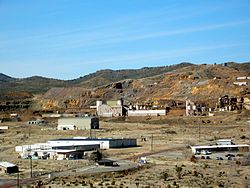Mountain Pass is an unincorporated community in San Bernardino County, California, United States. It is situated on Interstate 15 in the southeast mountainous desert region of the state approximately 15 miles (24 km) from the Nevada border at an elevation of 4,730 feet (1,440 m)—the highest point along I-15 between California and Nevada. It has a population of 30.[1][2]
Mountain Pass | |
|---|---|
 View of the settlement of Mountain Pass | |
| Coordinates: 35°28′13″N 115°32′42″W / 35.47028°N 115.54500°W | |
| Country | United States |
| State | California |
| County | San Bernardino |
| Elevation | 4,728 ft (1,441 m) |
| Time zone | UTC-8 (Pacific (PST)) |
| • Summer (DST) | UTC-7 (PDT) |
| ZIP Codes | 92366 |
| Area code | 760 |
The most prominent feature of the town, and its reason for existence, is the Mountain Pass Mine, an open pit mine for rare-earth elements. The mine and its associated processing facilities are owned by MP Materials, which purchased the assets out of bankruptcy on July 10, 2017.[3]
Climate
editTypical of the High Desert, Mountain Pass has a cold semi-arid climate (Köppen climate classification BSk), Winters are chilly but also sunny, with daytime highs around 50 and nighttime lows just below freezing. Summers are hot and somewhat wetter, with July, the hottest month, having a normal high in the low 90s. Although dry weather usually prevails in most months, the wettest months are July and August when thunderstorms commonly form over the nearby mountain ranges, which can cause flash flooding. Snow is rare but not uncommon, usually falling 2-3 times a year. Most of the snow doesn't stick to the ground very long, usually melting by mid afternoon.
| Climate data for Mountain Pass, California. (Elevation 4,740 ft) | |||||||||||||
|---|---|---|---|---|---|---|---|---|---|---|---|---|---|
| Month | Jan | Feb | Mar | Apr | May | Jun | Jul | Aug | Sep | Oct | Nov | Dec | Year |
| Record high °F (°C) | 71 (22) |
76 (24) |
81 (27) |
90 (32) |
104 (40) |
109 (43) |
110 (43) |
109 (43) |
102 (39) |
96 (36) |
89 (32) |
70 (21) |
110 (43) |
| Mean daily maximum °F (°C) | 50.4 (10.2) |
53.7 (12.1) |
59.0 (15.0) |
66.4 (19.1) |
76.3 (24.6) |
87.0 (30.6) |
92.8 (33.8) |
89.9 (32.2) |
83.9 (28.8) |
72.4 (22.4) |
58.9 (14.9) |
51.1 (10.6) |
70.2 (21.2) |
| Mean daily minimum °F (°C) | 29.5 (−1.4) |
32.4 (0.2) |
35.8 (2.1) |
41.0 (5.0) |
49.8 (9.9) |
59.2 (15.1) |
66.5 (19.2) |
64.5 (18.1) |
56.6 (13.7) |
46.3 (7.9) |
36.2 (2.3) |
30.2 (−1.0) |
45.7 (7.6) |
| Record low °F (°C) | 3 (−16) |
6 (−14) |
12 (−11) |
19 (−7) |
28 (−2) |
36 (2) |
42 (6) |
44 (7) |
33 (1) |
21 (−6) |
10 (−12) |
−2 (−19) |
−2 (−19) |
| Average precipitation inches (mm) | 0.92 (23) |
0.89 (23) |
0.89 (23) |
0.48 (12) |
0.27 (6.9) |
0.20 (5.1) |
1.04 (26) |
1.23 (31) |
0.59 (15) |
0.54 (14) |
0.68 (17) |
0.63 (16) |
8.36 (212) |
| Average snowfall inches (cm) | 2.7 (6.9) |
1.8 (4.6) |
1.4 (3.6) |
0.5 (1.3) |
0.2 (0.51) |
0 (0) |
0 (0) |
0 (0) |
0 (0) |
0.1 (0.25) |
1.1 (2.8) |
1.5 (3.8) |
9.3 (24) |
| Source: The Western Regional Climate Center[4] | |||||||||||||
References
edit- ^ "Mountain Pass, California CA, profile (San Bernardino County)". ePodunk. 2008. Retrieved March 4, 2009.
- ^ Population and elevation according to city limit sign on I-15 northbound.
- ^ "The Californian Rare Earths Mine Caught Between Trump and China". Bloomberg News. September 26, 2018. Archived from the original on October 9, 2018. Retrieved November 7, 2018.
- ^ "Seasonal Temperature and Precipitation Information". Western Regional Climate Center. Retrieved March 29, 2013.
